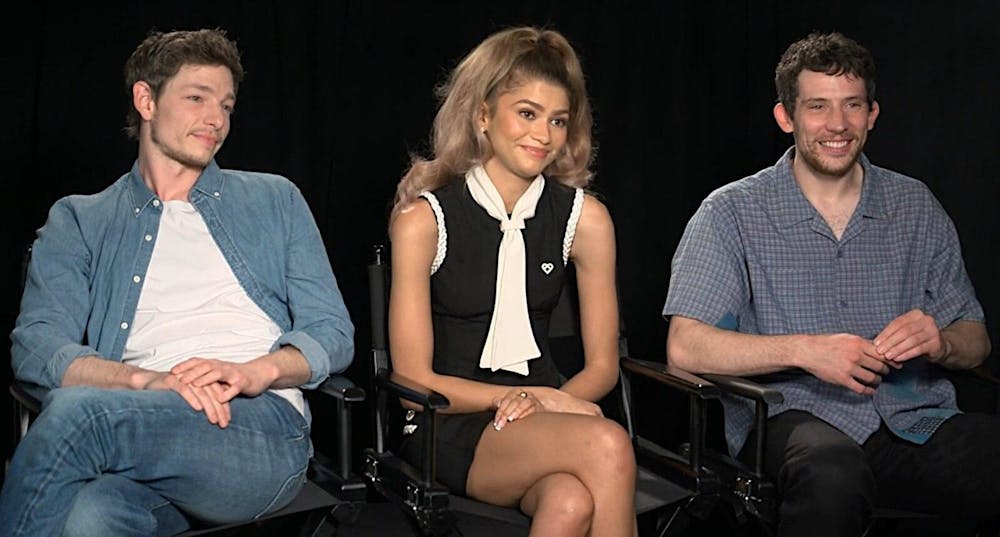It has been quite the spring for Zendaya. First, there was “Dune: Part Two,” a stunning spectacle of cinematic mastery that stunned moviegoers back in March. Now, the actress has abandoned her stillsuit for tennis whites to star in director Luca Guadagnino’s “Challengers,” a teasing, tension-filled triumph that is already dominating both the charts and the cultural conversation.
Best known for 2017’s Academy Award-winning “Call Me By Your Name,” Guadagnino is never reliant on one particular genre or narrative style, but his filmography is harmonious in its sleek and seductive exploration of beautiful people and their beautiful sensibilities.
“Challengers” is no exception. One of the year’s most anticipated releases, the film follows a decade-long love triangle between three tennis prodigies, tracking them across the years through both shared and individual triumphs and defeats. Dynamics of jealousy and pride are executed masterfully, with stellar performances not only from Zendaya, but also from Josh O’Connor and Mike Faist — the former of “The Crown” and “La chimera,” and the latter of “West Side Story” and the upcoming “The Bikeriders.”
These performances are guided by a sharp screenplay from playwright and novelist Justin Kuritzkes. In exquisite fashion, he crafts a narrative in which the line between tennis and sex is blurred to the point where it no longer exists. The dialogue is powerful, but it is the moments of silence — shot in stormy parking lots and lonely hotel rooms — that truly speak volumes.
The film first introduces Zendaya’s Tashi Duncan as a once-bright star, now forced into retirement by an injury and resigned to channeling her brand of acute and aggressive ambition into the coaching of her husband, Art Donaldson. In a desperate bid to reestablish his greatness and reaffirm his confidence heading into the US Open, Tashi enters Art in a Challenger event. Predictably, it is at this titular tournament where the pair encounters Patrick Zweig — the erstwhile third player in their convoluted game of love.
The film then flashes back to more than a decade previously, seeing all three players competing in the US Open junior championships. Patrick and Art are doubles partners, fire and ice, best friends and perhaps something more — that, Guadagnino leaves open to interpretation. What he does show is their mutual infatuation with Tashi, whom they meet and pursue at the same time in competition both on and off the court.
The plot flies back and forth in time like a tennis ball over a net, showing the development — or lack thereof — of the relationship between the three over the years. Much of this drama happens on the court, where cinematographer Sayombhu Mukdeeprom demonstrates a great appreciation for what is beautiful about tennis. His shot selection is remarkable, from the players’ perspective to the ball’s-eye-view to even a view from beneath the court.
In a striking homage to a famous courtside shot from Alfred Hitchcock’s “Strangers on a Train,” Zendaya stares straight ahead as the audience around her rubbernecks rapidly from side to side. Another shot frames the back of her designer bob directly in between a fiercely competing Art and Patrick — an on-the-nose metaphor, yes, but a nonetheless effective one.
These on-court battles feel almost more suggestive than the film’s intimate scenes, as sweat glistens from dripping bodies and rallies leave players gasping and grunting in exertion. Atticus Ross and Trent Reznor's relentless score adds to the tension in the scenes — the thumping beats combine with the thwacking of tennis balls to highlight the sport’s viscerality and even violence. Occasionally, the needle drops are overwhelming to the point of obscuring the dialogue beneath them, but even those choices feel purposeful in the unceasing kineticism they manufacture.
Notably, “Challengers” lacks much in terms of supporting cast, beyond a chair umpire played by Zendaya’s personal assistant Darnell Appling. Rarely are such mainstream features so concentrated on so few primary players, and indeed this mold only serves to emphasize the lack of development throughout all three, altogether dislikeable characters. O’Connor gives audiences a Patrick whose egotism is rooted in chaotic neutrality, and Faist an Art whose attempted vulnerability comes off only as weakness. Throughout it all, Tashi remains inscrutable, with Zendaya’s poised pout never giving way to true emotion — be it passion or penance.
Early in the film, Tashi compares tennis to a relationship, and the act of playing to being in love. Yet “love” means nothing in tennis, and arguably, nothing to Tashi. Victory may be sweet, but voracity is sweeter, and what Tashi most desires is the unique form of social and psychological warfare that occurs between individuals on a court, perhaps an explanation for the years of turmoil to which she has subjected her “little white boys.” Ultimately, Guadagnino is saying, don’t hate the players — hate the game.







